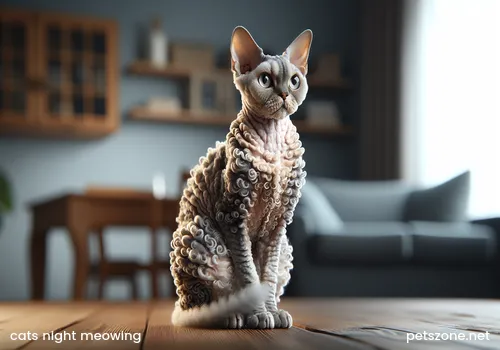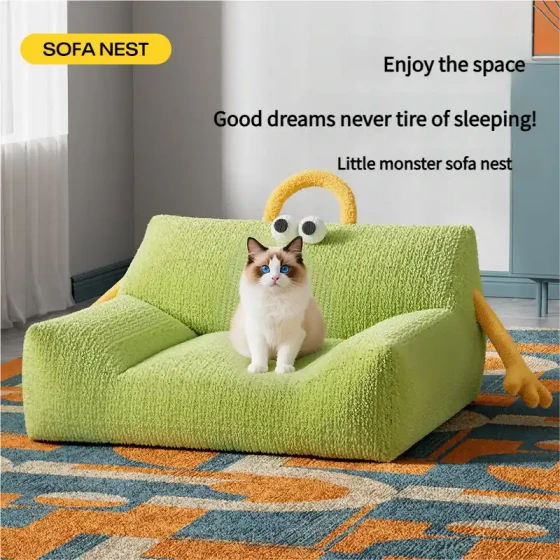Magic Tool to Prevent Cats from Meowing Late at Night_Useful Tips to Make Cats Sleep Quietly
Cats meowing at night not only may affect the owner's sleep but often signal that the cat is trying to communicate some need. Understanding the reasons behind cats meowing at night and adopting targeted methods is key to solving this problem. By adjusting routines, increasing interaction, and ruling out health issues, most cats can learn to sleep better at night.
Cats, these mysterious and charming little creatures, may be quiet sleeping beauties during the day but can become "night singers" at night, producing various sounds that trouble many cat owners. From a faint “meow” to prolonged “howling,” the reasons for nighttime meowing are diverse. It could be simple physiological needs or hidden health problems or behavioral habits. To have a peaceful night, we need to act like detectives and carefully analyze the truth behind the cat’s "late-night KTV."

Why Do Cats Prefer to "Sing" Late at Night?
To solve the problem, we first need to know the reasons. Cats meowing at night usually have the following possible causes:
-
“Hungry! Thirsty! Need to poop!” (Physiological needs)
This is the most direct cause. If the cat’s food bowl is empty, water bowl dry, or litter box too dirty, it may use vocalization to remind you. Imagine waking up hungry in the middle of the night, wouldn’t you want some food? Cats feel the same. -
“Bored! Lonely! Seeking attention!” (Behavioral needs)
Cats really need companionship and interaction. If the owner is busy working during the day and doesn’t give them enough attention and playtime, energetic cats may use meowing at night to seek your attention. It’s a bit like a child throwing a tantrum, hoping you’ll play with them. Especially for cats who like to be close to people, waking up at night to find you not nearby may make them feel lonely and vocalize. -
“Something feels off here!” (Environmental changes or discomfort)
Sudden changes in environment, such as moving, new family members (pets or humans), rearranged furniture, can cause stress or unease in cats, triggering nighttime meowing. Also, if the sleeping area is uncomfortable, too cold or too hot, they may meow to express displeasure. -
“I don’t feel well…” (Health problems)
This point is very important and cannot be ignored! Persistent night meowing, especially accompanied by loss of appetite, depression, unusual behaviors, may suggest health issues. Pain, hyperthyroidism, kidney disease, cognitive dysfunction (common in senior cats, similar to Alzheimer’s in humans), can cause restlessness or painful cries at night. According to pet health experts, any persistent, unexplained night meowing should be promptly checked by a veterinarian. -
“It’s mating season!” (Estrus)
Unspayed male and female cats vocalize more frequently and loudly during mating season, naturally seeking mates. The cries of female cats in heat are particularly piercing and can last several days or longer. -
“I’m used to it!” (Bad habits)
Sometimes, cats’ nighttime meowing may be “trained” by the owner. For example, if the owner softens and feeds or gives attention immediately upon hearing meows, the cat learns that meowing brings benefits, reinforcing the behavior and forming a habit.
Practical Tips for Making Cats Sleep Quietly — “Magic Tool to Prevent Cats from Meowing Late at Night”
After understanding the reasons, we can apply targeted solutions. Here are some practical methods to help your cat have a peaceful night:
-
Step One: Must see the vet!
Before taking any behavioral intervention, please be sure to take your cat to the veterinarian to rule out potential health problems. This is crucial! If the cat is meowing due to pain or illness, any behavioral correction is futile and may delay treatment. The vet will conduct a detailed exam and provide professional treatment if health issues are found. -
“Burn energy during the day, sleep soundly at night”
The saying “play enough during the day, naturally quiet at night” is very appropriate for cats. Increase your cat’s daytime activity and interact more with them to consume their energy. Especially within an hour or two before sleep, conduct focused, quality play sessions, such as using a teaser wand to simulate hunting, letting them jump and chase until tired. This helps cats enter deep sleep at night more easily. You can also provide puzzle or treat-dispensing toys for daytime self-entertainment. -
Adjust diet and routine
Ensure your cat is not hungry before sleeping. Feeding a small meal before bed, especially protein-rich food, helps keep them satiated longer. Also, maintain a regular schedule for feeding, playing, and sleeping, so the cat develops a time sense and knows what to do when. -
Ignore inappropriate "night concerts"
If the cat’s meowing is to seek attention, the most effective method is ignoring. This may sound harsh but is key to breaking bad habits. “The more you respond, the more intense it gets.” Any response, even scolding, reinforces the behavior. Close bedroom doors, wear earplugs, and firmly do not respond. Initially, it might get worse as the cat tries harder to get attention, but persistence will teach them this doesn’t work. Of course, this requires patience and determination from the owner. -
Provide safety and a comfortable environment
Prepare a cozy, warm sleeping area for your cat, such as a cat bed, mat, or cardboard box. Some cats like sleeping in their owner's room; if conditions allow and you don't mind, let them sleep in a small bed near yours, as your scent will make them feel secure. Keep the litter box clean and water fresh so they can easily satisfy basic needs if they wake at night. Increase environmental enrichment, such as cat trees and window perches, giving them more exploration and activity space. -
Consider spaying/neutering
If your cat has reached mating age and you have no breeding plans, spaying/neutering is the most thorough and effective way to stop mating season meowing. It not only eliminates estrus troubles but also reduces some reproductive diseases risks. -
Address special needs of senior cats
Older cats may meow at night due to declining body function, pain, or cognitive decline. Besides timely vet visits, provide softer, more comfortable sleeping areas, adjust indoor temperature, and ensure easy access to food, water, and litter box. Under veterinary guidance, medication may be needed to ease pain or improve cognition.
Frequently Asked Questions
- Q: My cat meows all night. Is it because it sleeps too much during the day?
A: That’s possible. Cats are crepuscular, but house cats’ routines are easily influenced by owners. Without enough stimulation and interaction during the day, they may save energy for nighttime release. Increasing playtime during the day helps regulate their routines. - Q: When I hear my cat’s pitiful meowing at midnight, can I hug it?
A: It depends on the reason. If it’s unease caused by health or environmental changes, appropriate soothing is fine. But if it’s habitual meowing seeking attention, hugging or responding reinforces the behavior. Learning to distinguish the meaning of the meow is important. - Q: Are commercial cat sleep aid products effective?
A: Some products, like pheromone sprays or diffusers, may help ease cat anxiety to some extent. But they are not “magic tools,” results vary by cat, and do not replace addressing root causes. Always consult a vet before using products. - Q: Will having two cats play with each other and stop meowing at night?
A: For some cats, adding a companion relieves loneliness and boredom, helping reduce night meowing. But it depends on cats’ personalities; not all cats get along, and blindly adding cats might cause new problems. Introducing a new cat requires caution, preparation, and gradual isolation.
Summary
Nighttime meowing by cats is common but rarely unsolvable. The key is owners’ patience, observation, and correct response. First, rule out health problems—that’s the most important prerequisite. Then, by adjusting the cat’s daily habits, increasing interaction, providing a comfortable environment, and behavioral training if needed, most cats gradually adapt to their owners’ schedules and enjoy peaceful nights. Remember, every cat is an individual and may require different approaches. Be patient, try various methods, and you will find the “mute mode” most suited for your home’s “night singer.”
References:
* Discussions on cat behavior and health on professional pet care websites and forums.
* Veterinary popular science articles on common cat diseases and behavior issues.


-560x560.webp)
